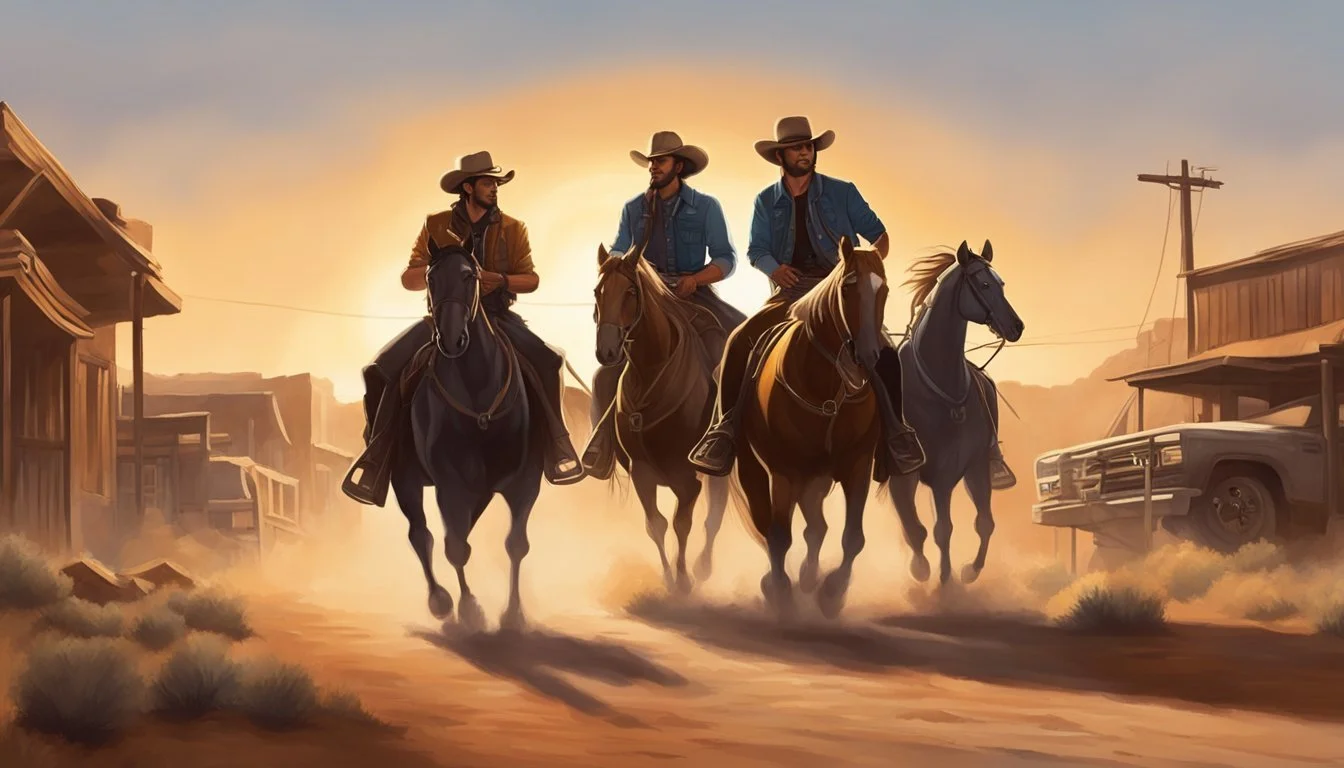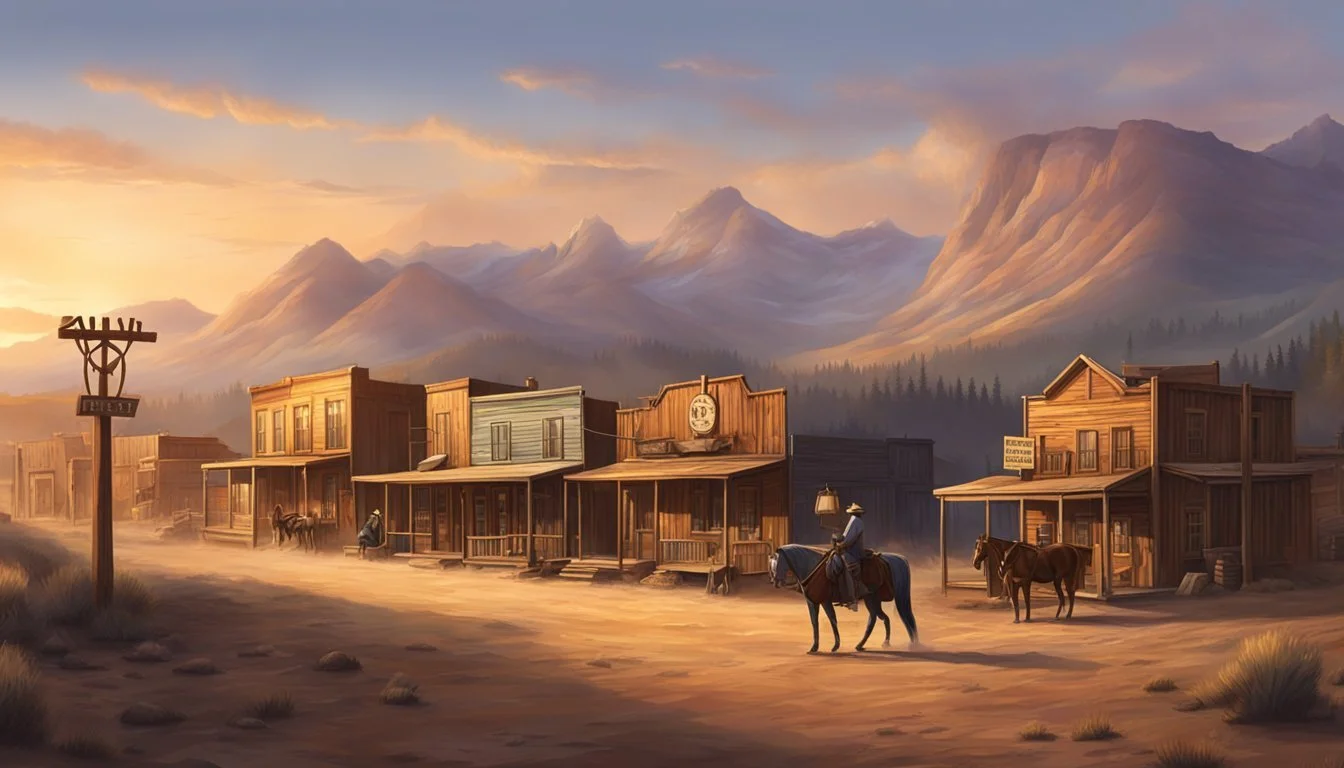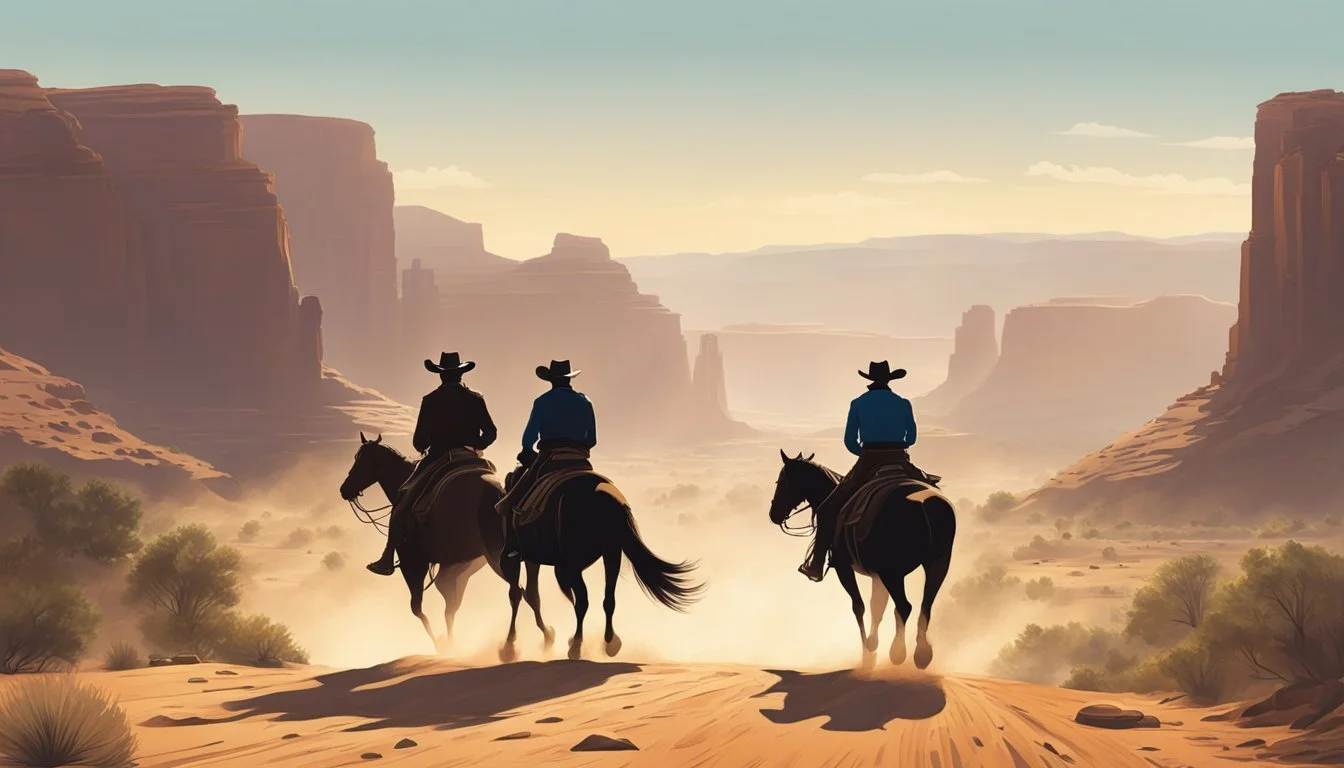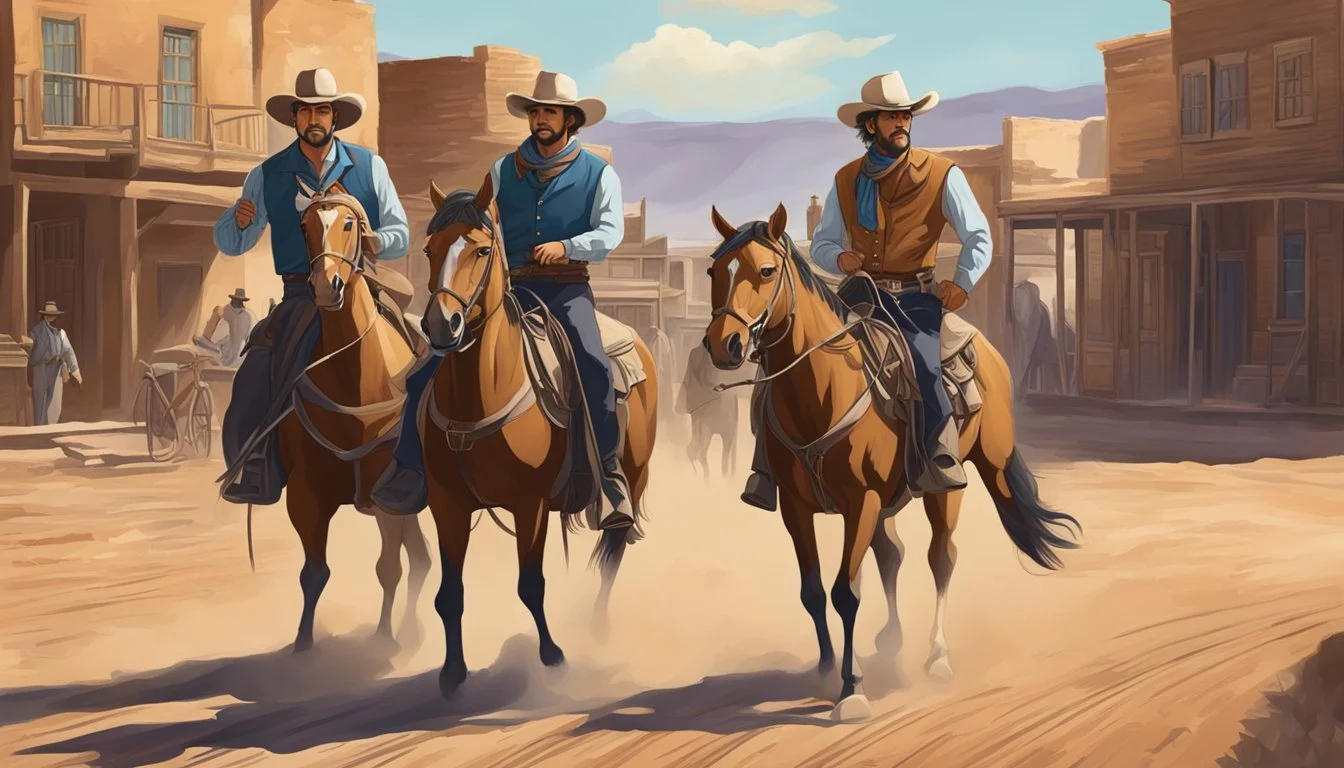Country Outlaws' Secret Hollywood Past: Willie and Kris's Shocking Western Escapades
Willie Nelson and Kris Kristofferson have starred together in several Western movies, combining their musical talents with their acting abilities. These films showcase the duo's on-screen chemistry and bring a unique blend of country music star power to the Western genre.
One notable collaboration between Nelson and Kristofferson is the 1986 TV movie "Stagecoach," a remake of the classic 1939 film. In this version, Kristofferson plays the Ringo Kid, while Nelson takes on the role of Doc Holliday. The movie follows a group of passengers traveling through dangerous Apache territory in 1880s Arizona.
Another Western featuring Nelson and Kristofferson is the 1999 TV film "The Long Kill," also known as "Outlaw Justice." This movie tells the story of two aging ex-Confederate gunfighters who reunite to seek revenge for the murder of a former gang member. Nelson and Kristofferson portray Lee Walker and Jesse Ray Torrence, respectively, as they embark on a journey of vengeance against a recently released prisoner who believes his old associates are responsible for his incarceration.
Origin and Context
Western movies featuring Willie Nelson and Kris Kristofferson emerged during a revival of the genre in the 1980s. These films blended classic Western themes with the star power of country music icons.
Inception of the Western Genre
Western films have been a staple of American cinema since the early 20th century. They typically depict life in the American Old West during the late 19th century. These movies often feature cowboys, outlaws, and frontier settlers.
Early Westerns established iconic elements like gunfights, horseback chases, and rugged landscapes. The genre's popularity peaked in the 1950s and 1960s with films starring actors like John Wayne and Clint Eastwood.
Rise of Western Movies in the 1980s
The 1980s saw a resurgence of interest in Western films. This revival introduced new themes and updated storytelling techniques. Filmmakers sought to appeal to modern audiences while honoring traditional Western elements.
In 1986, Willie Nelson and Kris Kristofferson starred in a TV movie remake of "Stagecoach". This adaptation brought fresh energy to the classic story. It showcased the appeal of casting well-known musicians in Western roles.
The success of "Stagecoach" paved the way for more collaborations between Nelson and Kristofferson. Their on-screen chemistry and musical backgrounds added a unique dimension to the Western genre.
Key Cast Members
Willie Nelson and Kris Kristofferson starred together in several Western films, showcasing their musical talents and acting abilities. Their collaborations extended beyond music into cinema, often alongside other country music legends.
Willie Nelson's Filmography
Willie Nelson's acting career spans decades, with notable Western roles. In the 1986 TV movie "Stagecoach," Nelson appeared alongside Kris Kristofferson and Johnny Cash. He played Lee Walker in "Outlaw Justice" (1999), a revenge-driven Western featuring Kristofferson as Jesse Ray Torrence.
Nelson also starred in "Songwriter" (1984) as Doc Jenkins, a country music composer navigating the industry's challenges. His on-screen chemistry with Kristofferson was evident in this film, where they portrayed longtime musical partners.
Kris Kristofferson's Acting Career
Kris Kristofferson's acting resume includes numerous Westerns. He played the Ringo Kid in the 1986 "Stagecoach" remake, sharing the screen with Willie Nelson and Johnny Cash. In "Outlaw Justice," Kristofferson took on the role of Jesse Ray Torrence, an ex-Confederate seeking vengeance.
Kristofferson's Western credentials extend to other films, often collaborating with fellow musicians-turned-actors. His partnership with Nelson, Waylon Jennings, and Johnny Cash as part of The Highwaymen occasionally translated to film projects, blending their musical prowess with acting skills.
Noteworthy Productions
Willie Nelson and Kris Kristofferson starred together in several Western-themed TV movies that showcased their on-screen chemistry and musical talents. These productions brought classic Western storytelling to television audiences.
The Long Kill
"The Long Kill" aired in 1999, directed by Bill Corcoran. Nelson and Kristofferson portrayed aging gunslingers who reunite their former gang to avenge a murdered comrade. The teleplay blended elements of revenge and redemption.
The film capitalized on the stars' real-life friendship and musical partnership. It featured original songs performed by the lead actors, adding authenticity to their portrayal of seasoned cowboys.
"The Long Kill" received praise for its gritty depiction of the Old West and the nuanced performances of its veteran cast. Critics noted how Nelson and Kristofferson brought gravitas to their roles as men confronting their violent pasts.
Outlaw Justice
"Outlaw Justice" premiered in 1999, continuing Nelson and Kristofferson's on-screen collaboration. The plot centered on ex-Confederate soldiers seeking vengeance against a former comrade who betrayed them.
Nelson played Lee Walker, while Kristofferson took on the role of Jesse Ray Torrence. Their characters embarked on a dangerous mission after their old gang member Holden emerged from prison, hellbent on revenge.
The film explored themes of loyalty, betrayal, and the lingering impacts of the Civil War on the American West. It showcased Nelson and Kristofferson's ability to portray complex, morally ambiguous characters with depth and authenticity.
Supporting Cast and Crew
The 1986 Western film "Stagecoach" boasted an impressive supporting cast alongside Willie Nelson and Kris Kristofferson. Several notable actors and musicians brought depth to the ensemble, enhancing the remake's appeal.
Contributions of Anthony Newley and Elizabeth Ashley
Anthony Newley played a key role as the gambler Hatfield. His portrayal added a layer of sophistication to the character. Newley's theatrical background shone through in his performance, bringing nuance to the morally ambiguous gambler.
Elizabeth Ashley took on the part of Dallas, a role originally played by Claire Trevor in the 1939 version. Ashley's interpretation of the saloon girl with a heart of gold provided emotional depth to the film. Her chemistry with Kristofferson's Ringo Kid character was particularly noteworthy.
Both Newley and Ashley brought decades of acting experience to their roles, elevating the overall quality of the production.
Appearances by Johnny Cash and Waylon Jennings
Johnny Cash starred as Marshal Curly Wilcox, bringing his iconic presence to the lawman role. Cash's gravitas lent authority to the character, making his interactions with the other passengers compelling.
Waylon Jennings portrayed the character of Hatfield, the Southern gambler. His performance added authenticity to the Western setting, drawing on his country music roots.
The inclusion of Cash and Jennings alongside Nelson and Kristofferson created a unique blend of music and film star power. Their collective presence gave the remake a distinct flavor, appealing to both Western film fans and country music enthusiasts.
Themes and Tropes
Westerns often explore complex moral themes through iconic characters and settings. Revenge and justice intertwine as central motivations, while outlaws embody both heroism and villainy.
Revenge and Justice in Westerns
Revenge drives many Western plots, serving as a catalyst for character development and conflict. Protagonists frequently seek retribution for past wrongs, blurring the line between justice and vengeance. This theme resonates in films featuring Willie Nelson and Kris Kristofferson, where characters grapple with moral dilemmas.
Lawmen and vigilantes alike pursue their own brand of justice in lawless frontier towns. The quest for righteousness often leads to violent confrontations, testing characters' moral boundaries.
The Iconography of the Outlaw
Outlaws in Westerns embody a complex mix of rebellion, freedom, and danger. These characters often challenge societal norms and corrupt authority figures. Willie Nelson and Kris Kristofferson have portrayed memorable outlaws, capturing their rugged individualism and charisma.
Key outlaw imagery includes:
Wide-brimmed hats
Weathered leather attire
Distinctive firearms
Outlaws frequently serve as anti-heroes, garnering audience sympathy despite their criminal actions. Their portrayal reflects cultural attitudes towards authority and personal liberty.
Setting and Time Period
Western films often transport viewers to the rugged American frontier of the late 19th century. The 1986 remake of "Stagecoach" starring Willie Nelson and Kris Kristofferson captures this iconic era.
Historical Accuracy in Western Films
The 1986 "Stagecoach" is set in 1880 Arizona Territory. It depicts a perilous journey through Apache lands, reflecting real tensions of the time. The film showcases period-appropriate costumes, weapons, and transportation.
Willie Nelson portrays Doc Holliday, a legendary figure of the Old West. While the movie takes creative liberties, it nods to historical events and characters.
The stagecoach itself is a symbol of frontier travel and communication. It represents the push westward and the challenges faced by settlers and travelers.
The Mythical Old West
Western films often blend fact and fiction to create a romanticized version of the frontier. The 1986 "Stagecoach" continues this tradition.
It presents a world of gunslingers, outlaws, and lawmen. The film taps into the mythos of the Wild West, with its vast landscapes and rugged individualism.
Characters like Doc Holliday and the Ringo Kid (played by Kris Kristofferson) embody classic Western archetypes. They represent the complex morality and rough justice of frontier life.
The movie's depiction of Native Americans reflects both historical conflict and stereotypes common in Western films. It's important to view these portrayals critically, understanding their place in cinematic history.
Plot Synopses
Willie Nelson and Kris Kristofferson star in two Western films with similar revenge-driven storylines. Both movies feature the duo as aging gunslingers seeking justice for fallen comrades.
Overview of 'The Long Kill'
'The Long Kill' follows ex-Confederate soldiers Lee Walker (Willie Nelson) and Jesse Ray Torrance (Kris Kristofferson). They reunite their old gang to avenge the murder of a former member.
Sheriff Dalton (Travis Tritt) becomes involved in the conflict. The plot revolves around the pursuit of a killer named Holden, who has just been released from prison after serving an eight-year sentence.
Holden believes his old gang members are responsible for his imprisonment. He tracks down and kills one of them, setting the revenge plot in motion.
Summary of 'Outlaw Justice'
'Outlaw Justice', also known as 'Outlaw Justice (Once Upon a Time in a Western)', shares a similar premise to 'The Long Kill'. Willie Nelson plays Lee Walker, while Kris Kristofferson portrays Jesse Ray Torrence.
The story begins when a former Confederate renegade named Holden finishes his prison term. Blaming his old gang members, Holden seeks revenge by killing one of them.
This act prompts Walker and Torrence to embark on a vengeance trail together. The film follows their journey as they track down Holden and attempt to deliver their own brand of justice in the Wild West.
Cultural Impact
Willie Nelson and Kris Kristofferson's collaborations in Western films left an indelible mark on the genre. Their unique blend of musical talent and acting prowess brought a fresh perspective to traditional Western storytelling.
Influence on Modern Westerns
Nelson and Kristofferson's appearances in films like "Stagecoach" (1986) helped revitalize the Western genre for a new generation. Their star power attracted audiences who might not have otherwise been interested in Westerns. This crossover appeal paved the way for future country music stars to transition into film roles.
The duo's performances challenged conventional Western hero archetypes. They portrayed more nuanced, flawed characters that resonated with modern viewers. This approach influenced subsequent Western films to explore more complex themes and character development.
Legacy of Willie Nelson and Kris Kristofferson in Film
Nelson and Kristofferson's film careers extended beyond Westerns, but their cowboy roles remain iconic. Their natural charisma and authenticity brought credibility to their portrayals of Western characters.
The pair's musical backgrounds added depth to their film roles. In some cases, they contributed original songs to movie soundtracks, enhancing the overall viewing experience. This integration of music and film became a hallmark of their collaborations.
Their work in Westerns also helped preserve the genre during a time when it was waning in popularity. By introducing their established fan bases to Western films, they ensured the genre's continued relevance in popular culture.
Critical Reception and Reviews
"Outlaw Justice" (also known as "The Long Kill") received mixed reviews upon its release. Critics praised the star power of Willie Nelson and Kris Kristofferson but had varying opinions on the film's overall quality.
Some reviewers appreciated the authentic Western feel of the movie. The performances of Nelson and Kristofferson were particularly highlighted, with Nelson's portrayal of Lee Walker described as "unflappable" by certain critics.
The film's setting in Almeria, Spain, a popular location for Spaghetti Westerns, added to its visual appeal. This aspect was noted positively by several reviewers familiar with the genre.
However, some critics found the plot formulaic and predictable. The revenge storyline, while typical of Western films, didn't offer many surprises to seasoned viewers of the genre.
The inclusion of country music stars Willie Nelson, Kris Kristofferson, Travis Tritt, and Waylon Jennings was seen as a draw for fans of both Westerns and country music. Their performances were generally well-received.
Despite its shortcomings, "Outlaw Justice" found an audience among Western enthusiasts and fans of its star-studded cast. The film's blend of traditional Western elements with the musical background of its leads created a unique viewing experience for many.






